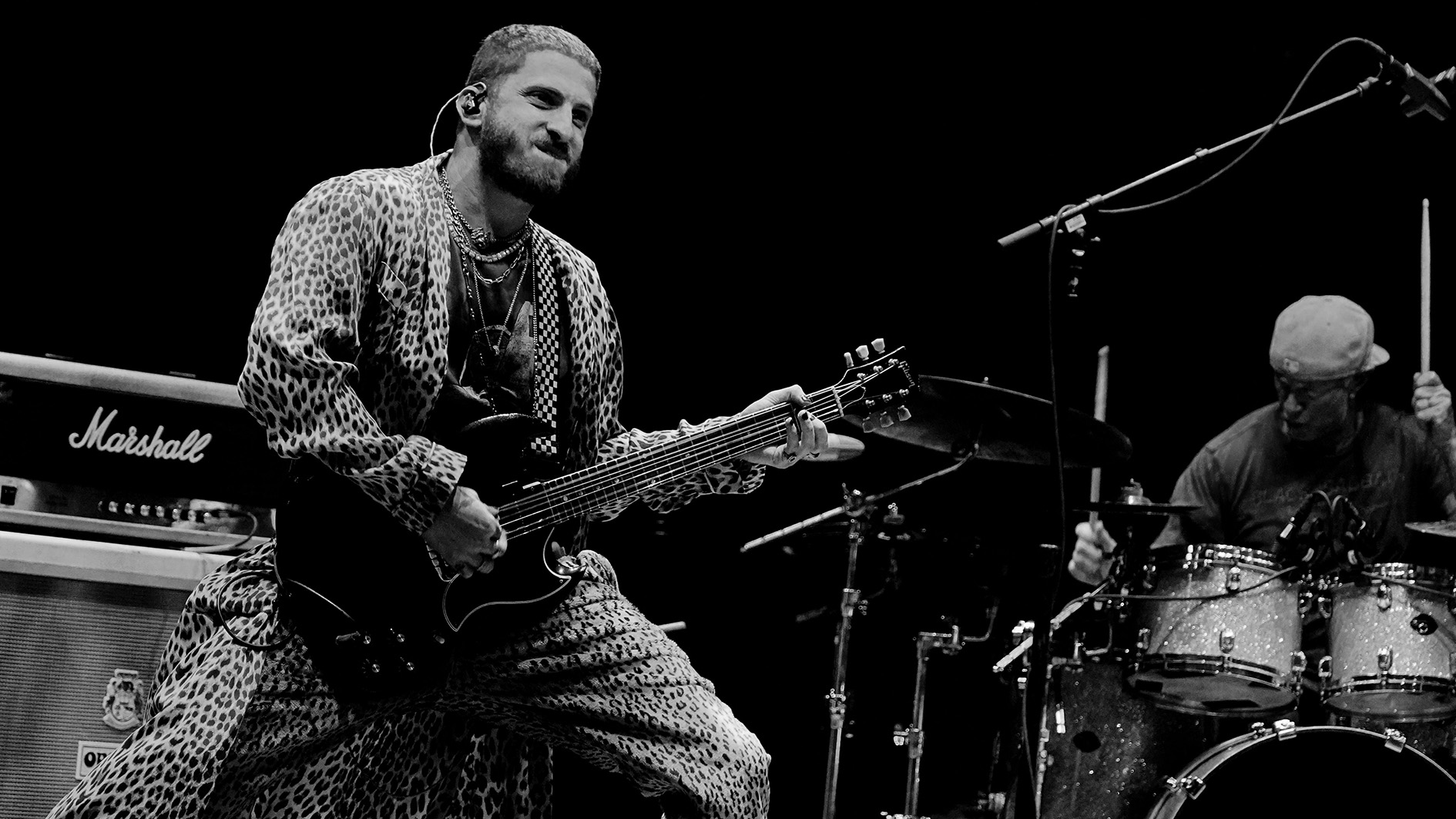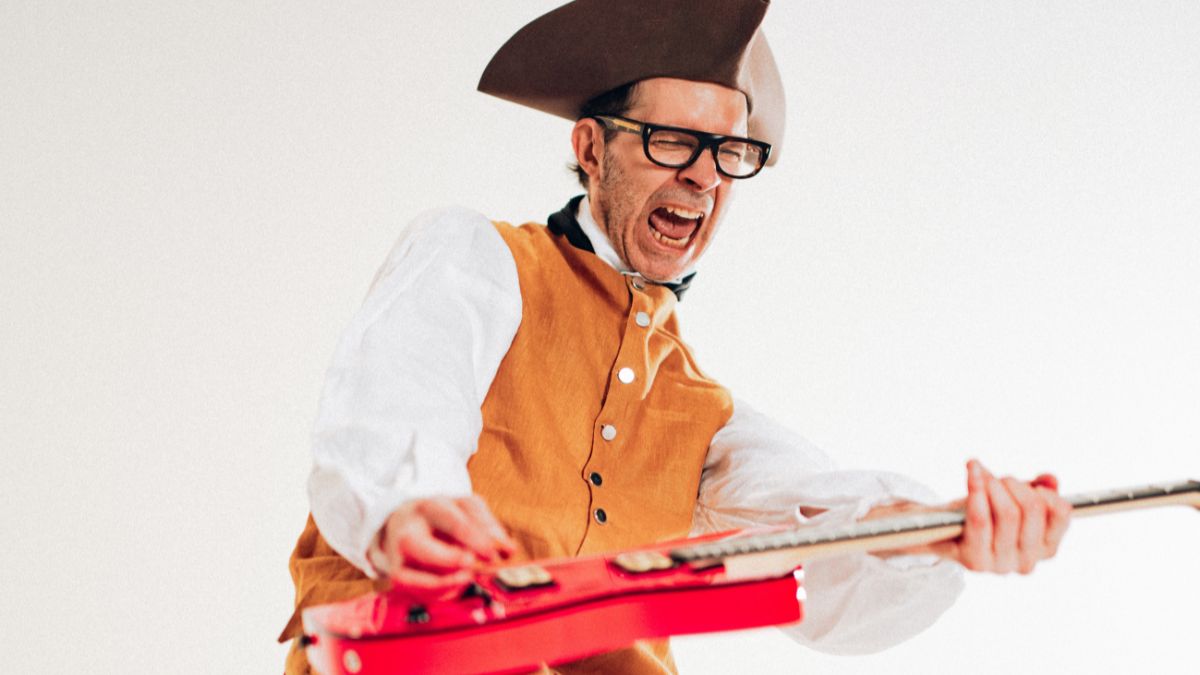Andrew Watt: “I’m making music with no deadlines – It’s a lot freer. Because of that, cooler choices are being taken”
A year-plus after his debut GW cover appearance, we find out how the Grammy-winning producer/guitarist goes from working with Ozzy Osbourne to Miley Cyrus and Justin Bieber – and back again

All the latest guitar news, interviews, lessons, reviews, deals and more, direct to your inbox!
You are now subscribed
Your newsletter sign-up was successful
There's a beautiful, bat-shaped symmetry to the bookending of producer/guitarist Andrew Watt’s 2020.
What began with a slot shredding alongside Ozzy Osbourne for the Godfather of Metal’s invigorating Ordinary Man comeback album was closed out with an all-star New Year’s Eve livestream of Watt, Slash, Post Malone and Red Hot Chili Peppers drummer Chad Smith – all of whom were instrumental in the making of Ordinary Man – coursing through an epically bombastic cover of Black Sabbath’s War Pigs.
Even so, it’d be unfair to not point out the other thrills peppered in between these events. November, for instance, saw Miley Cyrus’ Watt-produced, guitar solo-scorched Plastic Hearts album topping the Billboard rock album charts.
Watt’s wide breadth of pop, metal, trap-rock and disco-infused production work for Osbourne, Cyrus, A Boogie Wit da Hoodie, Dua Lipa and more resulted in his first-ever Producer of the Year nomination – and win – at the Grammys.
But Watt’s big year was also marked by a more personalized – and terrifying – struggle. Like millions across the US, the 30-year-old guitarist/producer was afflicted by the coronavirus.
This was back in March 2020, early enough into the pandemic that it took several tries to even be diagnosed properly by doctors, some of them incredulous to COVID-19 even being considered a possibility for his feverish symptoms and breathing complications.
His recovery period during the spring was intense, leaving him bed-ridden and receiving oxygen at his home in Beverly Hills. But months after his first Guitar World cover story [May 2020], a staggering series of professional highs, and a major health scare, Watt is humble, grateful and ultimately optimistic regarding how he’ll remember the roller coaster that was 2020.
All the latest guitar news, interviews, lessons, reviews, deals and more, direct to your inbox!
![[L-R] Miley Cyrus and Andrew Watt](https://cdn.mos.cms.futurecdn.net/8vryuFFXbYGJCjeyUZ99RX.jpg)
“I got to work on a lot of music that I absolutely adore. What I’m taking out of it, if I didn’t already know it, is that music is the greatest healer of all. You know, I was really sick during the beginning of [2020], and music was the thing that got me back to feeling like myself again.”
Watt is saying this on the line from home shortly before meeting up with a mystery musician whom he’s hoping to collaborate with in 2021. Meanwhile, he’s temporarily paused on the sessions for his and Ozzy’s follow-up to Ordinary Man, owing to an early winter surge of COVID-19 cases across California. He’s also on board for another record with Cyrus, though that’s still in the planning stages.
This is all to say that Watt is back in the swing of things as an in-demand guitarist/producer, though he admits it took a long time for him to build up the strength to even pick up a guitar, let alone contemplate entering his Gold Tooth Music home studio.
“I just didn’t want to play when I was sick; I had this negative thing in me that was killing the world. It was the first time in my life where I didn’t feel like [playing guitar].”
What helped Watt turn the corner was a conversation with longtime friend Justin Bieber. The musicians had collaborated on a pair of bonus cuts for Bieber’s Purpose album from 2015, and then the next year on DJ Snake’s tropical house-flavored global megahit Let Me Love You, but it had been a while since the two had been in a studio together. The Canadian-born pop star reached out to change that.
I just didn’t want to play when I was sick; I had this negative thing in me that was killing the world. It was the first time in my life where I didn’t feel like playing guitar
“He told me he was starting to work on his new album. He wants this album to be more live instruments – stadium-like music! I told him how I was feeling, but he was like, ‘You’ve got to use your gift.’
“So I went [into my studio] and started making stuff for him, made some of the best music I’ve ever made in my life. [Now] I’m reconnected to my craft.”
Just as the New Year’s clock struck midnight – about the time Watt and co were jamming on War Pigs – Bieber premiered a new single called Anyone, one of five tracks Watt produced for the pop singer’s since-released Justice.
While it’s a weapons-grade power ballad, Watt’s guitar playing on the track is subtle, subsisting of chorus effect-employing arpeggios that weave themselves around crystalline synth patches, canyon-sized snare hits and Bieber’s passionate croon.
It’s a much different zone for him to inhabit compared to, say, the tapping clinic he brings to Ozzy/Post Malone collaboration Take What You Want, or the paint-peeling runs he ravages through during the glammy bump of Plastic Hearts’ title track.
What unifies these disparate approaches is how Watt generally builds out songs with a few phrases from a six-string (“I start by writing on my couch with my acoustic guitar”) and by tapping into the spirit of a “12-year-old rock fan".
“The cool thing about all these different people is they let me play my guitar,” he elaborates enthusiastically. “They allow me to write in the way I’m most comfortable: contributing with a guitar in my hands. In that respect, that’s the similarity. But, you know, how could it be the same making music for Ozzy Osbourne as it would for Justin Bieber?”
While Watt’s production jobs highlight their respective artist’s style over his own personal flair, there is some connective tissue between the projects. Take how he spreads the octave-blare of a vintage Univox Super-Fuzz wide open during Osbourne’s gloomily pounded Goodbye and Cyrus’ scrappy, punk-pop banging WTF Do I Know.
Last year, Watt also managed to put his slide skills front and centre on both Cyrus’ Angels Like You and English singer Sam Smith’s gracefully swayed Kids Again.
The guitarist bottled out his leads with a mock lap steel-approach, opting to stretch a Duesenberg Double Cat on the former and a Gretsch White Falcon on the latter across his legs before delivering either of these especially slippery, soulful solos.
“I love playing slide! I think it’s the closest way to make a guitar sound like the human voice,” Watt says.
Though he’s quick to note that his slide work isn’t especially bluesy, Watt will admit to taking inspiration from a slide player literally etched into his very being. “I have a tattoo of George Harrison on my left index finger so that when I look down at the slide I remember to be melodic. George is my favorite slide player. The melodies he would play are so haunting and eerie.”
Guitar-wise, the upcoming Ozzy album has been tracked with Watt’s Gibson ’62 SG Special “glued to my hands,” but he’s also giving love to a Les Paul previously owned by Mick Ronson.
He’s also starting to feel out a fat-necked SG recently gifted to him by his mentor, Roots guitarist “Captain” Kirk Douglas (Watt undertook a yearlong apprenticeship with the Tonight Show six-stringer in New York when he was 18).
This album is going to be like that: people from all walks of music coming together. It’s going to be the tightest band you’ve heard in a long time, with different vocalists on each song
Cyrus’ Plastic Hearts was recorded using a small Supro combo and a mid-'80s Marshall Silver Jubilee, but his various sessions this year may take advantage of a newly acquired Roland Jazz Chorus.
While timelines for any of these records have yet to be fixed in stone, it’s clear that between his next LPs with Ozzy and Miley, and other as-yet-unknown variables, there’s plenty of Watt-produced material coming through the pop-rock pipeline in the near future.
For the first time in five years, though, Watt is also ready to put his name at the top of a project. In 2016, shortly after folding his California Breed power trio alongside Deep Purple’s Glenn Hughes and drummer Jason Bonham, Watt delivered his debut solo EP, Ghost in My Head, an eclectic hard rocker that showcased his vibrato-heavy lead waggling, as well as a deceptively velveteen vocal rasp.
As he explains now, a forthcoming full-length solo release will have him, instead, passing the mic.
“I love Ghost in My Head, and it was a very important part of my life that record, but this album is going to be more collaboration-based. My favorite records that I’ve made are when I get to connect people together, for example the Ozzy/Post Malone collab [Take What You Want]; pieces from different worlds.
“This album is going to be like that: people from all walks of music coming together. It’s going to be the tightest band you’ve heard in a long time, with different [vocalists] on each song.”

Though the solo album is likewise in its early days, Watt confides that it will, in part, feature Chad Smith on drums. For that matter, so will the Ozzy album (“he plays on everything he has time for,” Watt says).
The Ozzy record also features Foo Fighters’ Taylor Hawkins on drums, and while Guns N’ Roses’ Duff McKagan handled low end duties on Ordinary Man, the forthcoming follow-up will have Metallica bass-slinger Rob Trujillo returning to Ozzy’s band for the first time since the early ’00s. And as he had on 2001’s Down to Earth, Trujillo is bringing riffs to the table.
“He loves Ozzy, and has such a breadth of knowledge about Ozzy, obviously being in the band [earlier] and having to learn all the songs. He’s contributing to this album with love in his heart for this guy. It’s not about, ‘Oh, I want to play on an Ozzy album.’ Ozzy is family to him!”
The songs on Ozzy's next album are deeper, longer and more journey-like
Like Ordinary Man, the next album will pay homage to “all eras of Ozzy,” but structurally the differences could end up being seismic. Ordinary Man had been written in a matter of days – Watt ploughing through songwriting sessions with Smith and McKagan.
While the title cut was a regal power ballad featuring Elton John, there’s an overall manic energy to compact, punky bursts like It’s a Raid and Straight to Hell.
Watt’s pace is less frantic this time around, with the producer allowing himself some space to explore arrangements as the schedule gets pushed back due to the pandemic.
“The songs are deeper. They’re longer, more journey-like,” Watt says, adding that one tentative album track clocks in at eight-and-a-half minutes, a full three minutes longer than anything on Ordinary Man.
“Last time we made the album in kind of a vacuum; that was what was so fun and exciting about it. Now we’re taking our time and making a lot of music, and, obviously with Covid, making sure Ozzy stays safe.
“It was getting a little better in LA, enough so that it was safe to work, but now it’s so bad that we’re on pause until the vaccine hits. We’ll get it done; people will hear it. I’m excited about it.”
![[L-R] Andrew Watt and Ozzy Osbourne](https://cdn.mos.cms.futurecdn.net/YJ9j9qtj3hqwZAHohAQBcE.jpg)
Between the recent Bieber release and impending projects from Ozzy, Miley Cyrus and more, 2021 could be another massive year for Watt.
Then again, living through the time of COVID has meant constantly adjusting on the fly. Recording sessions have been called off as a safety precaution, while in general people are becoming more accustomed to pushing their work off into the distance. Deadlines are in the abstract. Watt’s end goal for any of these records is fuzzy, but, honestly, the unknowns of what’s yet to come are part of the fun.
“I’m not making music with the hopes of this being released at [a specific] time. I’m making music with no deadlines; there’s no gun to my head. It’s a lot freer. Because of that, cooler choices are being taken.”
Gregory Adams is a Vancouver-based arts reporter. From metal legends to emerging pop icons to the best of the basement circuit, he’s interviewed musicians across countless genres for nearly two decades, most recently with Guitar World, Bass Player, Revolver, and more – as well as through his independent newsletter, Gut Feeling. This all still blows his mind. He’s a guitar player, generally bouncing hardcore riffs off his ’52 Tele reissue and a dinged-up SG.

